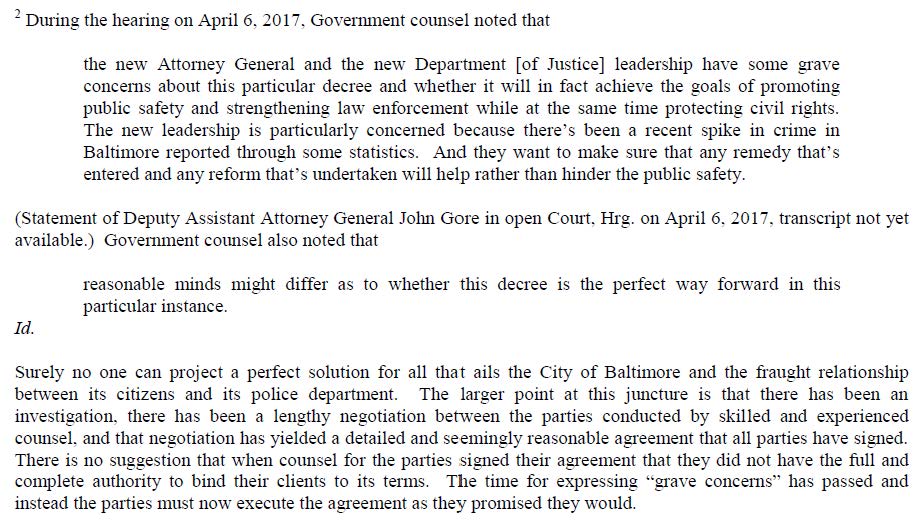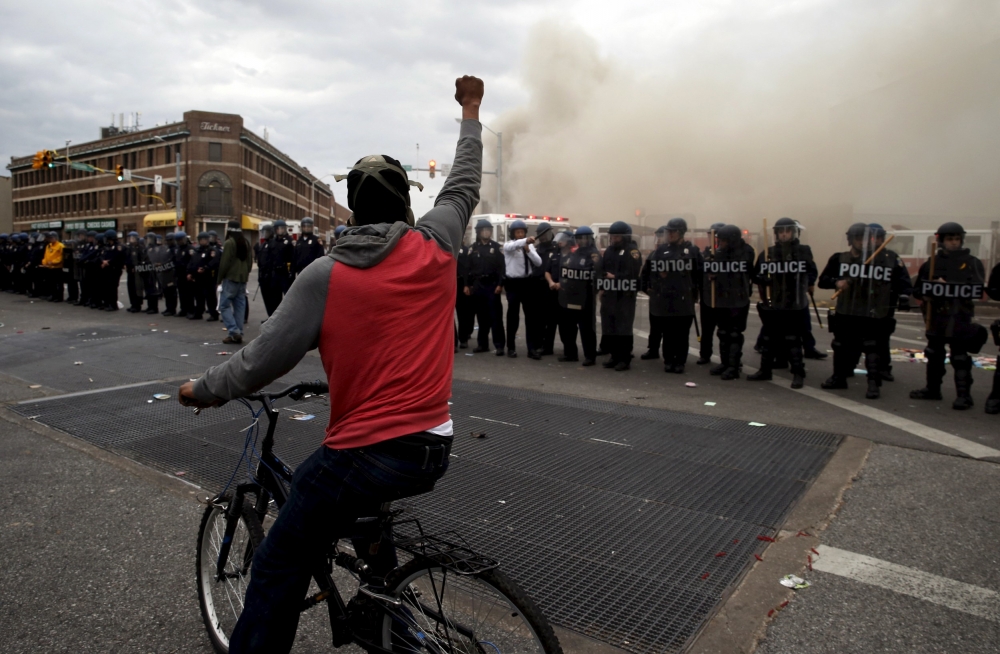My LTE in STrib – Mar-a-Lardo search
August 13th, 2022
tRump loses again in Federal Court! Oh, Baltimore…
April 7th, 2017

Our Loser-in-Chief has lost again, this time in his attempt to torpedo the Consent Decree, settled after the investigation by the Department of Justice into practices of the Baltimore Police Department.
It all started with a complaint, after the Freddie Gray shooting and subsequent unrest in Baltimore, against the Baltimore Police and the City, alleging Constitutional violations, and then an intense investigation of the Baltimore Police Department. Since tRump’s inauguration, and after the settlement was reached, a Motion was filed by “the Government” in essence requesting “an additional opportunity to consider whether it wants the Court to enter the decree at all, or at least the current version of it.” From the Order:
As always, the footnotes are where it’s at, in this case pointing out the paucity of tRump’s arguments:

There’s a distinct trend when tRump’s administration goes to court. L-O-S-E-R! Now, tRump, just stop it, and take all these federal court orders and decisions into account before you stick your foot in it again.
DoJ Findings: Use of Force in Violation of Constitutional Rights
January 13th, 2017
The Dept. of Justice’s report on its investigation of the Chicago Police Department practices is out, and the DoJ’s press release notes that its findings, linked below, include:
A consent decree is in the works. We’ll see if that helps.
Primary documents:
- Chicago Police Department Findings
- Chicago Agreement in Principle
- Chicago Police Department Findings Fact Sheet
- Pattern or Practice Accomplishments Document
These are must reads for a cold winter day.
DOJ Report on Baltimore Police — FAIL!
August 15th, 2016
THIS IS A MUST READ! Apologies for the delay… Trying to catch up, this was released and I got bogged down in something else.
It’s grim. For those questioning all the complaints regarding Baltimore police, just a scan of the table of contents is enlightening:
- BPD MAKES UNCONSTITUTIONAL STOPS, SEARCHES, AND ARRESTS
- BPD DISCRIMINATES AGAINST AFRICAN AMERICANS IN ITS ENFORCEMENT ACTIVITIES
- BPD USES UNREASONABLE FORCE
- BPD UNLAWFULLY RESTRICTS PROTECTED SPEECH
- BPD’S HANDLING OF SEXUAL ASSAULT INVESTIGATIONS RAISES SERIOUS CONCERNS OF GENDER-BIASED POLICING
And the conclusion:
- SYSTEMIC DEFICIENCIES IN BPD’S PRACTICES CONTRIBUTE TO CONSTITUTIONAL VIOLATIONS, ERODE COMMUNITY TRUST, AND INHIBIT EFFECTIVE POLICING
From the report:
The constitutional violations described in our findings result in part from critical deficiencies in BPD’s systems to train, equip, supervise, and hold officers accountable, and to build relationships with the broader Baltimore community. First, BPD fails to adequately supervise its officers. This lack of supervision manifests itself in multiple ways, including a failure to guide officer activity through effective policies and training; a failure to collect and analyze reliable data to supervise officer enforcement activities; and the lack of a meaningful early intervention system (EIS) to identify officers who may benefit from additional training or other guidance to ensure that they do not commit constitutional violations. Second, BPD lacks meaningful accountability systems to deter misconduct. BPD does not consistently classify, investigate, adjudicate, and document complaints of misconduct according to its own policies and accepted law enforcement standards. Indeed, we found that BPD personnel sometimes discourage complaints from being filed and frequently conduct little or no investigation—even of serious misconduct allegations. As a result, a culture resistant to accountability persists throughout much of BPD, and many officers are reluctant to report misconduct for fear that doing so is fruitless and may provoke retaliation. Third, BPD fails to have proper agreements in place to coordinate its activities with other agencies that are operating within its jurisdiction. Fourth, BPD fails to adequately support its officers through effective strategies for recruitment, retention, and staffing patterns, and does not provide them with appropriate technology and equipment. Fifth, BPD does not engage effectively with the community it polices. BPD’s failure to use accepted community policing strategies and transparency mechanisms erodes the community trust that is central to productive law enforcement.
- BPD FAILS TO ADEQUATELY SUPERVISE ITS OFFICERS’ ENFORCEMENT ACTIVITIES
- BPD FAILS TO ADEQUATELY SUPPORT ITS OFFICERS
- BPD FAILS TO HOLD OFFICERS ACCOUNTABLE FOR MISCONDUCT
- BPD DOES NOT COORDINATE WITH OTHER AGENCIES APPROPRIATELY
- BPD FAILS TO ENGAGE IN EFFECTIVE COMMUNITY POLICING
And the conclusion?
For the foregoing reasons, the Department of Justice concludes that there is reasonable cause to believe that BPD engages in a pattern or practice of conduct that violates the Constitution or federal law. The pattern or practice includes: (1) making unconstitutional stops, searches, and arrests; (2) using enforcement strategies that produce severe and unjustified disparities in the rates of stops, searches and arrests of African Americans; (3) using excessive force; and (4) retaliating against people engaging in constitutionally-protected expression. We also identified concerns regarding BPD’s transport of individuals and investigation of sexual assaults. BPD’s failings result from deficient policies, training, oversight, and accountability, and policing strategies that do not engage effectively with the community the Department serves. We are heartened to find both widespread recognition of these challenges and strong interest in reform. We look forward to working with the Department, City leadership, and Baltimore’s diverse communities to create lasting reforms that rebuild trust in BPD and ensure that it provides effective, constitutional police services to the people of Baltimore.
So what’s going to happen? Oh, Baltimore…
Other Department of Justice investigations of law enforcement HERE



